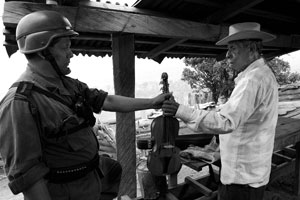-
FRANCISCO VARGAS: THE VIOLIN (2006)
FRANCISCO VARGAS: THE VIOLIN (2006)

DAGOBERTO GAMA, DON ANGEL TAVIRA
The authenticity of age
Francisco Vargas's The Violin is an intensely rich tableau of rural conflict in Mexico in the Guerrero region in the 1970's. The pictures of country people with their poverty and rugged faces are as vivid and convincing as the FSA dust bowl photographs of the American poor of the depression era, and the rich, grainy black and white cinematography with many intense close-ups heightens the period realism, while also evoking cinematic antecedents like Italian neo-realism.
Focusing on an old man, Don Plutarco Hidalgo (played by 81-year-old Don Angel Tavira), who plays the violin despite a missing right hand (as does the actor himself, subject of an earlier documentary by the filmmaker), The Violin tells the story of an incident in which peasant rebels were driven from their stronghold and then tracked down and killed. The opening titles accompany a prelude that shows from ground level a scene of brutal torture.
When the narrative proper begins, we see the wrinkled, poor, but dignified Plutarco, accompanied by his son Genaro (Gerardo Taracena) and grandson, Lucio (Mario Garibaldi). working as street entertainers to earn a few pesos for tortillas and cheese.
Later, the three are forced to split up when they go into the country and witness an army attack on their home. Don Plutarco ultimately displays exceptional coolness under pressure as he manages to charm a field commander of the military (Dagoberto Gama) and spirit out ammunition, and then eventually (the area bristling with armed guards) is trapped. He hides the fact that his son is one of the rebel leaders. The narrative arc is simple; but though it contains moments of considerable tension and suspense, The Violin is more important for its texture and its viewpoint than for the dramatic aspects of its action. Vargas, who with this film won the SKYY Prize for a first independent feature at the San Francisco International Film Festival, shows above all a sure hand with his non-actors and an ability to recreate his rural milieu flawlessly, while combining, as the award noted, a distinctive aesthetic with a strong political point of view.
Tavira makes Don Plutarco into a surprisingly understated hero, finding courage inside a dry, aged heart. The action in some ways is rather like a conventional western with good guys cut off at the pass. But it's not about that: unlike a more mainstream, conventional film, Vargas' is politically committed, deeply rooted in a particular place and specific humanity, a song of the Mexican common people. The black and white images will remain a pleasure to look at for a long time to come. But the film stands or falls on the unique interest of the lean, somewhat sphinx-like Don Plutarco. He is its strength and its weakness. He is an interestingly ineloquent figure, but the focus on him makes the story rather more a footnote than an epic. This is no Battle of Algiers, and is, of course, not meant to be.
Last edited by Chris Knipp; 05-14-2007 at 01:02 AM.
 Posting Permissions
Posting Permissions
- You may not post new threads
- You may not post replies
- You may not post attachments
- You may not edit your posts
-
Forum Rules





 Reply With Quote
Reply With Quote
Bookmarks